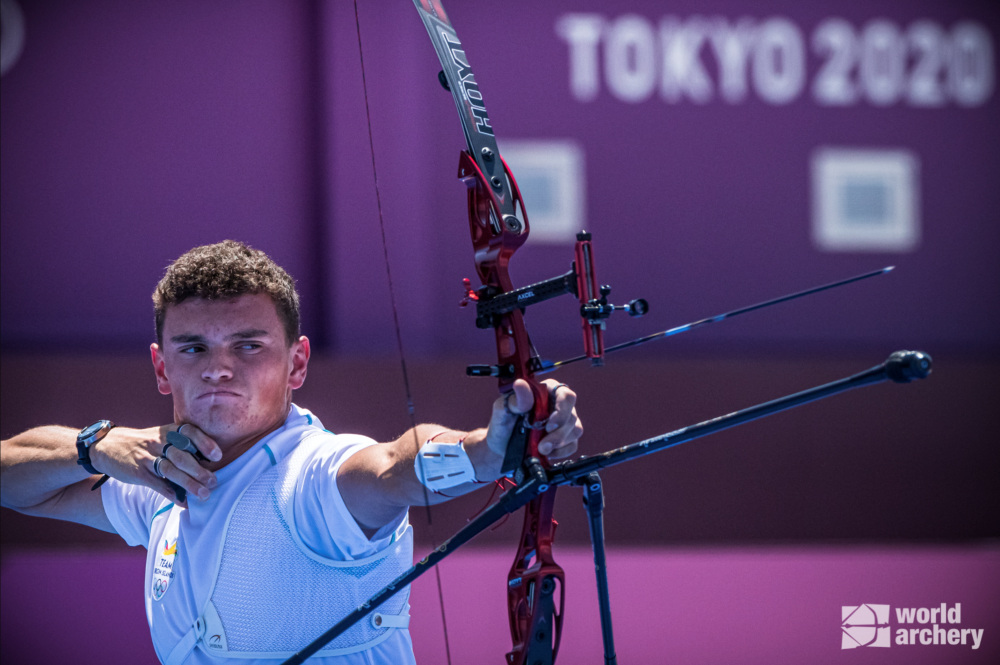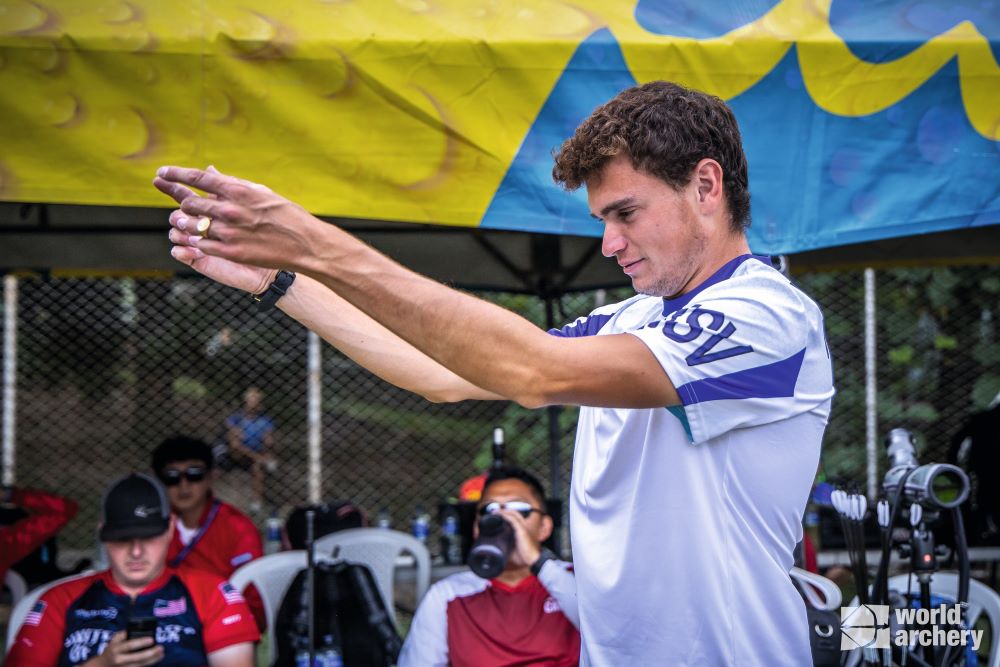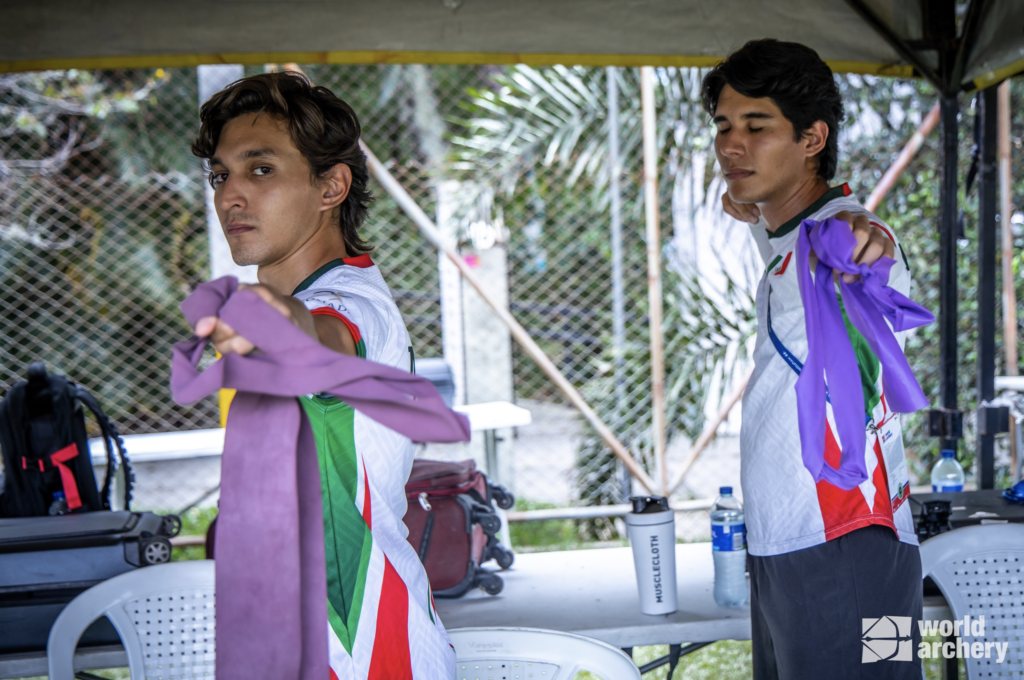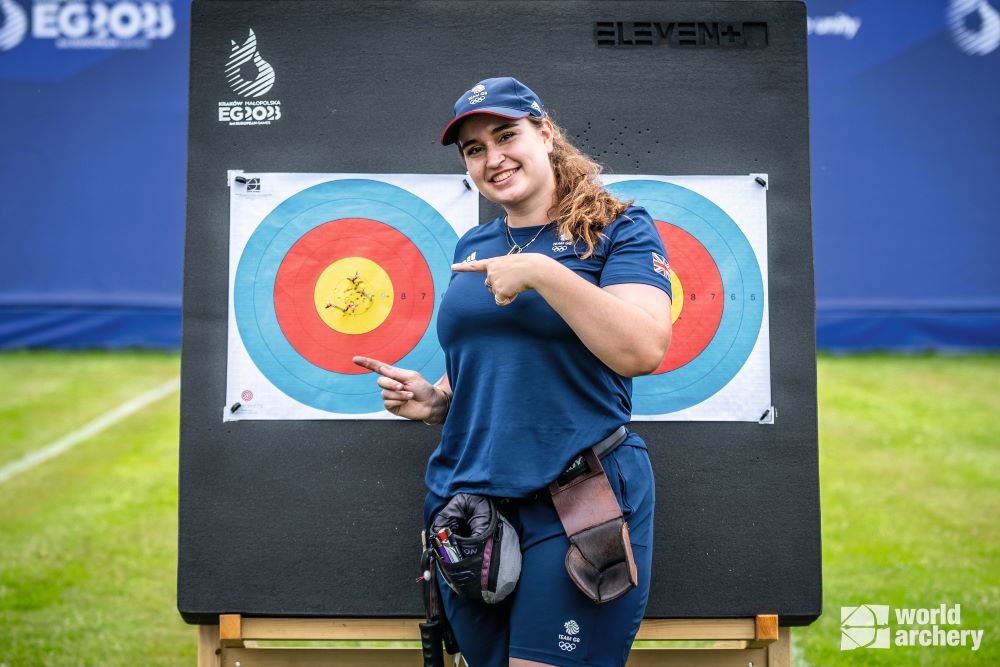Mimi Landström explores the most important aspect of the archer’s game.
A lot of archers talk about their mental game. But what is it? We spoke to a few of the world’s top archers about their approach to mental game, what they believe in, why they do what they do.

Inside the mental game
The mental game refers to the psychological aspect of the sport, or the mental skills and strategies that archers use to optimize their performance. While the physical and technical sides of archery are obviously important, the mental game plays a significant role in achieving consistent accuracy and success.
Some of the key elements to mental game in archery include focus and concentration, confidence, goal setting, visualisation, positive self-talk, managing pressure and nerves, resilience and mental toughness, and emotional control. These key components are not a simple click of the fingers, where it all goes perfectly in an instant, it takes time and effort, it requires hard work to understand, to learn to be aware of, and to be able to utilise properly.
Mental game is a very personal part of archery and there is no ‘one size fits all’ approach with it. Just because one thing works for a certain person, it does not mean that it will work for everyone. Every individual needs to find out what works with their shooting, their brain, their lifestyles. We caught up with Ella Gibson of Great Britain, compound women world number 1 and Nicholas D’Amour of the Virgin Islands, recurve men world number 7, to chat about their mental game, how they cope, how they have built their game up over the years, to be where they are today.

How do you mentally prepare for a competition?
I don’t do much, but of course I make sure that I have trained hard enough physically, and no matter what the circumstances are, whether I’ve been sick, or I am maybe not shooting as well as I would like to in practice, I always reassure myself that I am ready to fight. I do not second-guess my abilities and I always exude confidence in all aspects of my life, so that way when I go and compete, being confident is just second nature. So, before a competition I always make sure that no matter what, I make myself feel confidence by telling myself “I am ready and confident. “
How have you got to a mental state to be able to perform so well under pressure?
My ability to perform under pressure is a combination of two things. Firstly, it is the confidence state of mind that I use for all aspects of my life. Secondly, I use the KSL Shot Cycle which has a very clear and defined mental process. Many people confuse the KSL Shot Cycle with being all about biomechanical technique, angular movement, alignment, etc. However, the KSL Shot Cycle is, I would say, 60% about mental process and it is specifically designed to give you a clearly drawn out shot process, to help archers deal with pressure and to help mitigate things like target panic.
How important is mental game and why?
What mental game means to me is mental process and the attitude you choose to use to implement it in a competition. I have tried many different competition attitudes, being overly serious, being a bit less serious and making jokes. But what I have found works the best for me is to implement my shot process in competition with a pure stoic, but focused attitude.
If I am stoic, this means, no matter what I am feeling, I am controlling myself mentally enough, so no one on the outside can tell what I am feeling. This gives me a mental edge over my competitors and gives me the ability to analyse my process better, because it hones my mind to be more focused on the shot, rather than the previous one. My stoic nature does not allow outside influences to affect what I am doing on the shooting line.
How can someone get a better mental game/state?
My first piece of advice to anyone who is struggling with mental game is, first off, have self-confidence. I know many people could say that it is ‘easier said than done’, but, in my opinion, it is that easy. You have to say to yourself repeatedly that you are confident and that you can achieve whatever it is you want to achieve.

I remember when I was in high school, and I was just starting recurve with aspirations to qualify for the Tokyo 2020 Olympics. At the time I was a bit of a loser (at least in the eyes of my peers). I didn’t have any friends, I didn’t do a mainstream sport, and the only things I cared about were school and archery. People made fun of me for it. I could have either listened to those people, and felt sorry for myself and had no self-confidence, or I could have said to myself that they were the losers with no futures, and that I am the best archer that has ever lived, just no one knows it yet. It may seem a bit intense, and it may seem a bit arrogant to say that to yourself, but that level of self-confidence that I possessed is what made me bound for success in my opinion.
So, step one to becoming a more mentally stable competitor is belief in your own abilities and confidence. Then on top of all of that, having a clearly defined mental process.
“…I could have said to myself that they were the losers with no futures, and that I am the best archer that has ever lived…”

How do you mentally prepare for a competition?
Most of my preparation is more physical than mental. I make sure I train enough, I get my bow in a good enough place, I know what is going to happen when I get to the competition. So, I know all the timings, the rules, the layout, and having the knowledge of all, that calms me down when I’m nervous, because I’ve prepared for the competition.
“PERFORMING UNDER PRESSURE COMES DOWN TO EXPERIENCE.
THE MORE YOU DO IT, THE BETTER YOU GET AT IT.”
How have you got to a mental state to be able to perform so well under pressure?
Performing under pressure it, honestly, comes down to experience. The more you do it, the better you get at it. The first time you do it, you are not going to be perfect.
The first individual medal match that I was in, was at a youth cup in 2018 in Rovereto, Italy. I was in the gold medal match, and I lost. I got the silver. The match included me shooting a lovely 6 in the wind. There are going to be plenty of times we mess up in the real key moments of pressure, where we don’t deliver; but there will also be so many times that we do. And the more you do it, the more often you do deliver and the more you get used to it, and therefore you know it is possible.
I also practice the pressure environments as well. When I’m shooting in practice, especially before an important competition, such as a World Cup, I will purposely get myself into the mental state that I will be in at the competition. I’ll make myself nervous. I’ll visualise my surroundings, envisage I’m on the World Cup stage and I’ll say unhelpful things to myself. Things like “you can’t mess up”, “you have to shoot a ten”. To make myself physically shake and nervous. And tell myself “I must shoot a 10”, and if I don’t do it, I do it again and again until I shoot a 10, and I do this over until I shoot a 10 every single time.
I’ll pretend I’m in a shoot off and say I need an X and keep doing that, so then when I am nervous and I get to those moments and I say in my head “you need a 10 to win”, I have all of this experience that I have done at home, where I need a 10 to win and I have done it. So, I can go in there with confidence, knowing that I have done this so many times before so I’m going to be fine.
Do you have a shot process?
Yes, I have a shot process, but it is not something I think about. It’s not something I’m aware of. By now, it’s just kind of engrained in me, it’s more of my subconscious than it is my conscious.
I don’t really think about it much when I’m at full draw. All I think about is focusing on the 10, focus on where I want the arrow to go, that’s’ what I keep my focus on. I always say, “shoot for what you want, not what you don’t want”.
We are not trying to avoid the 9, we are shooting for the 10, and that is a very important distinction to make because it is different. I focus on trying to be ballsy and powerful, and certain, not on being cautious and nervous.
How important is mental game and why?
Mental game is very important because it’s a huge part of archery. Unlike other sports we don’t just need to try harder or be better. We must keep ourselves stable and a lot of that is from our mentality.
That kind of thing, honestly, just happens as we grow, as we shoot more, and get more experience. The best way to get better at it is to just practice it. Get yourself in those uncertain situations, get in those nervous spots, practice them if you can. If you’re not very good at visualising them or doing them yourself when you’re on your own, do it with other people. Go to your club and do it with your friends, do matches against each other.
When doing this, you need to take it seriously and really want to win. Keep doing it until you can rely on yourself to perform under pressure. So, when you go to that competition and you get just as nervous, you know you will be fine, and you will get practice at the smaller competitions. And when you go to the next one, you know you will be fine because you’ve done it at the little one.
It’s about putting in the time and effort and mentally focusing when you are practicing as well as when you compete.
Big thank you to both athletes for sharing their insights with us.

